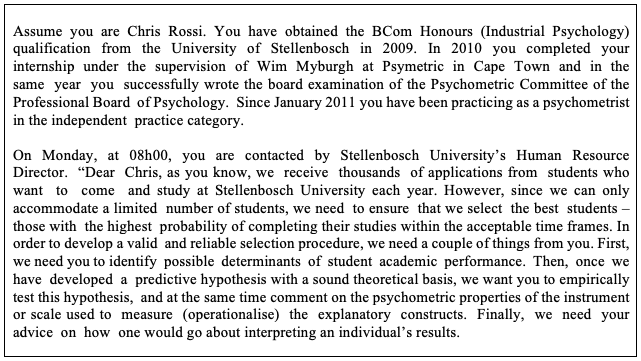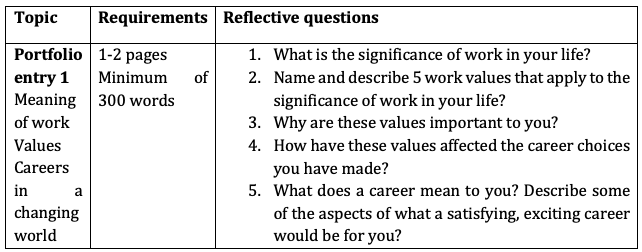The modules I teach vary in terms of the content and approach required to convey the learning content. Some modules are content heavy and require students to engage with and digest large amounts of theory that underpin the fundamental understanding and application of Industrial Psychology. What I have found is that many students have a limited conceptualisation of the world of work, as many have never worked before. This limits the extent to which the practical value of the content is immediately evident. In order to bridge this gap, I provide samples of tasks they may be required to complete (e.g. drawing up a job description) or examples of the application of theory to practice (e.g. videos demonstrating how an interview or performance appraisal is conducted). Other modules require a more practical approach where the theory is interwoven with calculations and interpretation of findings.
I make use of a variety of teaching methods and tools to engage my students and facilitate effective learning. I have a pragmatic approach to the types of classroom and online activities I employ in my modules i.e. I use activities or tools that are necessary and that work. This involves a degree of trial and error but I am not afraid to test new approaches to teaching or assessment. I have also learned the value of eliciting critical feedback from my students upon which I base my decisions to use or discontinue a particular method.
Even though I value and try to maximise the face to face class time I have with my students the literature suggests that students retain much less than we expect. My teaching practice has therefore evolved from only face-to-face teaching to a blended approach that maximises the use of the learning management system (SUNLearn). In class, I supplement the traditional lecture with relevant videos, practice examples, and discussions. I also use techniques such as “the muddiest point” to assess students understanding at various points in the module. The content of my lectures is then used to scaffold or underpin additional learning activities that are placed on SUNLearn, including quizzes, and assignments. These activities are either formative or summative assessments, some of which are voluntary while others are compulsory.
I have selected three samples of the learning activities I have created and employed in my courses.
Authentic learning assignment in Psychometrics 214
The authentic learning assignment was borne from student feedback which expressed a pressing and pertinent need for practical application of the content and an understanding of its real-world application. Students found the content complex and could see how the module applied to them and their future work. The following requests were made in the student feedback;
Do more practical work and the slides need to be updated and made simpler.
More class assignments to make the work more interactive.
In response my co-lecturer and I developed an assignment that created an opportunity for authentic learning. The assignment replaced one of the three tests through which students were assessed. The assignment was composed of four phases which were scaffolded by the class content, practical classes and additional resources e.g. podcasts, provided on SUNLearn. Students required to work in pairs to encourage collaborative learning throughout the process and have the opportunity to apply various aspects of the module content.
Sample of assignment structure

Sample of authentic learning assignment instructions

The assignment continues to be used and refined each year. Student feedback related to this assignment remains generally positive:
2016: The theory was interesting; the assignment was great in that it gave a better understanding of the work.
2017: Very interesting. Dit was ook baie prakties wat gehelp het om die werk te verstaan en te kan toepas op ander situasies.
2018: I really enjoyed the flow and timing of the project. Was very constructive to my knowledge and learning during the module.
In 2015 I collaborated with the blended learning coordinator to write up a case study on the authentic learning assessment which can be accessed here
e- Portfolio’s in Career Psychology (IP152)
Career Psychology is a theoretical, content-heavy module which was also a common complaint amongst students. I tried various approaches in the classes to make the content more accessible and digestible but I realised that the students were having difficulty conceptualising the practical applicability of the learning content, which I believe is key to effective learning.
I learned about e-portfolios at the blended learning short course I attended in 2014. I felt it would be a good inclusion as an assessment as it would offer the students an opportunity to reflect on and apply the theory to their own experiences and could be implemented as an activity on SUNLearn with relative ease. The e-Portfolio was comprised of broad reflective questions that were developed to guide the students through the most important themes in the module content and assisted them to reflect and make associations with their personal career experiences.
Samples of reflective questions

We anticipated that students would require support to create their e-portfolios and thus provided vodcasts and click by click instructions that explained the process in detail as well as and the contact details for individuals who could assist with more technical queries. The biggest challenge was that each portfolio required feedback and needed to be graded. We, therefore, developed a rubric for each activity and recruited and trained Honours students to assist with grading and providing feedback.
The e-portfolios were well received as highlighted in the following comments:
2014: E-portfolios were fun to complete and helped to use the study material in practical ways.
2015: The reflections have taught me how to apply the work I have learnt in the week, in everyday situations. I often find myself sitting in a lecture wondering to myself, “where will I ever use this?”; and by doing these reflections I have managed to apply to knowledge to practical situations.
2015: The reflections were also a good point of discussion between classmates as we did bounce off ideas from one another. This improved learning and interest through peer-to-peer interaction.
A short case study on the use of e-portfolios in this module can be found here
Despite the e-portfolios being well received by the students, the administrative task of grading and providing feedback became a challenge to manage and the decision was taken to first shorten it and finally discontinue the assessment.
Gamification in Introduction to Industrial psychology (Occupational therapy) IP132
The IP 132 (Occupational therapy) module was the sample for my Ph.D. study. The module required updating and thus offered an opportunity to renew the module content and update the learning outcomes. The student feedback also suggested that the students sought learning opportunities that; facilitated the practical application of the content that was taught; that was relevant to their field of study; which facilitated engagement and supported effective preparation for tests and exams. The feedback thus revealed desired outcomes that I used to guide the improvement of the learning activities and assessments in the module. The application of Gamification was also guided by theoretically derived design principles.
Sample of the learning management system

A short case study on the use of gamification in IP132 can be found here
